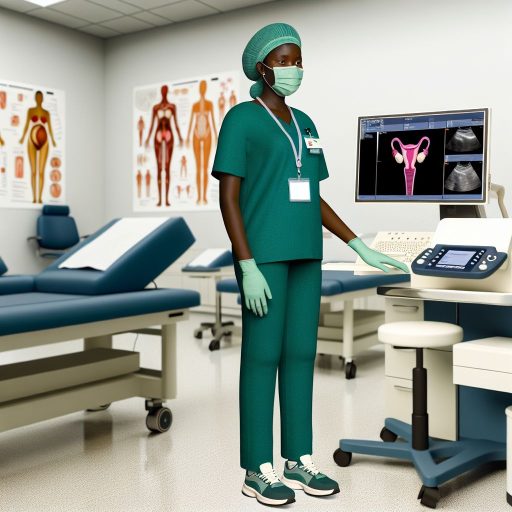Microbiological research centers in Nigeria play a vital role in advancing scientific knowledge.
These centers are crucial in addressing various health challenges facing the country.
Key research areas in microbiology include infectious diseases, antimicrobial resistance, and biotechnology.
Through microbiological research, solutions are developed to combat disease outbreaks and improve public health.
Research centers collaborate with local and international partners to enhance research capacity.
Microbiology research plays a significant role in shaping healthcare policies and interventions in Nigeria.
By studying microorganisms, researchers can develop vaccines, diagnostic tools, and treatment strategies.
Microbiological research centers are at the forefront of tracking emerging pathogens and implementing effective control measures.
These centers also contribute to the discovery of new drugs and therapies to combat infectious diseases.
Overall, microbiological research centers in Nigeria are essential for promoting health and well-being in the country.
List of Major Microbiological Research Centers in Nigeria:
- National Institute for Pharmaceutical Research and Development (NIPRD)
- Nigerian Institute of Medical Research (NIMR)
- Centre for Genomics and Infectious Diseases (CGID)
- Institute of Human Virology Nigeria (IHVN)
- Nigerian Institute of Science Laboratory Technology (NISLT)
Microbiological research in Nigeria has seen significant growth over the years with the establishment of several research centers dedicated to studying various aspects of microbiology.
These research centers play a crucial role in advancing knowledge, developing solutions to health challenges, and contributing to scientific innovation in the country.
Below is a list of some major microbiological research centers in Nigeria:
National Institute for Pharmaceutical Research and Development (NIPRD)
The National Institute for Pharmaceutical Research and Development (NIPRD) is a top research institution in Nigeria that focuses on pharmaceutical research and development.
NIPRD conducts research in various areas of microbiology, including drug discovery, antimicrobial resistance, and vaccine development.
Nigerian Institute of Medical Research (NIMR)
The Nigerian Institute of Medical Research (NIMR) is a leading medical research institute in Nigeria that conducts research in various fields, including microbiology.
NIMR’s microbiology research includes studies on infectious diseases, antimicrobial resistance, and public health interventions.
Centre for Genomics and Infectious Diseases (CGID)
The Centre for Genomics and Infectious Diseases (CGID) is a research center dedicated to studying genomics, infectious diseases, and microbiology.
CGID conducts cutting-edge research in genomics, pathogenomics, and host-pathogen interactions to understand disease mechanisms and develop targeted interventions.
Institute of Human Virology Nigeria (IHVN)
The Institute of Human Virology Nigeria (IHVN) is a leading research institution that focuses on studying human viruses, including HIV, hepatitis, and other infectious diseases.
IHVN’s research in virology and microbiology aims to improve diagnostics, treatment, and prevention strategies for viral infections.
Nigerian Institute of Science Laboratory Technology (NISLT)
The Nigerian Institute of Science Laboratory Technology (NISLT) is an institution that provides training and research in various scientific disciplines, including microbiology.
NISLT’s microbiology research focuses on laboratory techniques, quality control, and capacity building to enhance the practice of microbiology in Nigeria.
These microbiological research centers in Nigeria are at the forefront of scientific discovery and innovation.
They contribute immensely to the country’s healthcare system, drug development, and public health interventions.
Their research efforts are essential in addressing infectious diseases, antimicrobial resistance, and other microbiological challenges facing Nigeria and the global community.
Research Areas Covered by Microbiological Research Centers:
– Infectious diseases research
– Drug discovery and development
– Vaccines development
– Genetic sequencing and bioinformatics
– Environmental microbiology
Microbiological research centers in Nigeria focus on a wide range of research areas to address important issues related to public health, environmental sustainability, and biotechnological advancements.
These centers play a crucial role in advancing scientific knowledge and developing solutions to combat various microbial threats.
Infectious Diseases Research:
Infectious diseases remain a significant public health concern in Nigeria, with outbreaks of diseases such as malaria, tuberculosis, HIV/AIDS, and cholera.
Microbiological research centers conduct studies on the epidemiology, transmission, and treatment of these diseases to improve healthcare outcomes and reduce the burden of infectious illnesses.
Drug Discovery and Development:
Microbiological research centers in Nigeria are actively involved in the discovery and development of new drugs to combat antibiotic resistance and emerging infectious diseases.
Researchers explore novel compounds, natural products, and microbial sources to identify potential drug candidates that can be further developed for clinical use.
Vaccines Development:
Vaccine research is a critical focus area for microbiological research centers in Nigeria to prevent the spread of infectious diseases and protect vulnerable populations.
Scientists work on developing safe and effective vaccines against diseases like polio, meningitis, and yellow fever, which have a significant impact on public health in the country.
Genetic Sequencing and Bioinformatics:
Advancements in genetic sequencing technologies and bioinformatics have revolutionized microbiological research in Nigeria.
Transform Your Career with Expert Guidance
Get personalized mentorship consulting that’s tailored to your unique path. Our expert advice is actionable and exclusive.
Get StartedResearchers study the genetic makeup of microorganisms to understand their virulence, drug resistance mechanisms, and molecular evolution.
Bioinformatics tools are used to analyze large datasets and predict microbial behavior, which informs the development of targeted therapies and interventions.
Environmental Microbiology:
Microbiological research centers also focus on environmental microbiology to study the role of microorganisms in ecosystems, water quality, food safety, and bioremediation.
Researchers investigate how microbes interact with the environment, degrade pollutants, and contribute to ecosystem services.
This research is essential for sustainable environmental management and conservation efforts in Nigeria.
Learn More: History of Dental Therapy in Nigeria
Microbiological Research Centers in Nigeria
Microbiological research centers in Nigeria play a crucial role in public health.
These centers are responsible for various important tasks that contribute to the well-being of the population.
Role of Microbiological Research Centers in Public Health:
Disease Surveillance and Outbreak Investigation:
The research centers actively monitor and track diseases to ensure timely detection of outbreaks.
Effective containment measures are put in place to control the spread.
Epidemiological Studies:
Microbiological research centers conduct studies to identify patterns of disease spread.
Understanding risk factors aids in developing targeted interventions.
Drug Resistance Monitoring:
These centers play a key role in monitoring the emergence of drug-resistant pathogens.
Guidance for healthcare providers in prescribing appropriate treatments is provided.
Public Health Policy Development:
The research centers provide data and findings that inform the development of public health policies.
This includes guidelines at both national and local levels.
Health Education and Awareness Campaigns:
Microbiological research centers participate in health education initiatives.
They conduct awareness campaigns to educate the public about disease prevention and control measures.
You Might Also Like: Effective Study Techniques for Nigerian Medical Students
Collaboration with International Research Institutions:
Partnerships with global health organizations.
Joint research projects and initiatives.
Exchange programs for researchers and scientists.
Access to funding and resources for research.
Contribution to global health research efforts.
Partnerships with Global Health Organizations:
Microbiological research centers in Nigeria have established strong partnerships with renowned global health organizations such as the World Health Organization (WHO), Centers for Disease Control and Prevention (CDC), and the Bill & Melinda Gates Foundation.
These collaborations have enabled the sharing of knowledge, expertise, and resources to tackle pressing public health challenges both locally and globally.
Joint Research Projects and Initiatives:
Through collaborative efforts with international research institutions, microbiological research centers in Nigeria have been able to undertake joint research projects and initiatives focused on various aspects of infectious diseases, antimicrobial resistance, and vaccine development.
By pooling together diverse skills and resources, these partnerships have resulted in groundbreaking discoveries and advancements in the field of microbiology.
Exchange Programs for Researchers and Scientists:
To foster greater collaboration and knowledge exchange, microbiological research centers in Nigeria participate in exchange programs that allow researchers and scientists to work with their counterparts from international institutions.
These programs provide opportunities for skills development, exposure to cutting-edge research techniques, and the sharing of best practices in microbiological research.
Access to Funding and Resources for Research:
Collaboration with international research institutions has opened doors for microbiological research centers in Nigeria to access additional funding and resources to support their research endeavors.
This financial support enables the centers to expand their research capabilities, invest in state-of-the-art equipment, and attract top talent in the field of microbiology.
Contribution to Global Health Research Efforts:
By collaborating with international research institutions, microbiological research centers in Nigeria are actively contributing to global health research efforts.
Their participation in multinational studies, clinical trials, and epidemiological investigations plays a crucial role in advancing knowledge and finding solutions to complex health challenges on a global scale.
Through these collaborative efforts, the centers are making a meaningful impact in improving health outcomes and promoting disease prevention worldwide.
Explore Further: Latest Research in Restorative Dental Practices

Impact of Microbiological Research Centers on Healthcare Delivery:
Improving diagnosis and treatment of infectious diseases
Microbiological research centers play a crucial role in enhancing the diagnosis and treatment of infectious diseases in Nigeria.
They conduct research to identify new pathogens, study their resistance patterns, and develop effective diagnostic methods.
Development of new vaccines and therapies
These research centers contribute significantly to the development of new vaccines and therapies for various infectious diseases prevalent in Nigeria.
By conducting studies on different pathogens, they help in creating effective preventive measures and treatment options.
Advancement of medical technology and laboratory practices
Microbiological research centers are at the forefront of advancing medical technology and laboratory practices in Nigeria.
They invest in state-of-the-art equipment, train their staff on the latest techniques, and collaborate with international partners to ensure high-quality research outcomes.
Capacity building for healthcare professionals
One of the key impacts of microbiological research centers is capacity building for healthcare professionals.
Through training programs, workshops, and seminars, they enhance the skills and knowledge of doctors, nurses, and other healthcare workers involved in the diagnosis and treatment of infectious diseases.
Reduction of disease burden in Nigeria
By conducting research and developing innovative solutions, microbiological research centers contribute to the reduction of disease burden in Nigeria.
Their findings help in implementing more effective public health interventions, leading to improved health outcomes for the population.
Uncover the Details: Advancements in Oral Surgery Techniques in Nigeria
Challenges Faced by Microbiological Research Centers in Nigeria:
– Limited funding and resources
– Lack of research infrastructure and equipment
– Shortage of skilled researchers and experts
– Regulatory and ethical issues in research
– Competition from other research fields for funding and recognition
Microbiological research centers in Nigeria face numerous challenges that hinder their ability to conduct impactful research and contribute significantly to scientific advancements.
These challenges range from financial constraints to structural deficiencies and human resource gaps.
One of the major challenges faced by microbiological research centers in Nigeria is the shortage of funding and resources.
Limited financial support makes it difficult for these centers to invest in state-of-the-art equipment, hire top-notch researchers, and conduct large-scale studies.
Many microbiological research centers in Nigeria struggle with inadequate research infrastructure and equipment.
The lack of appropriate facilities hampers the ability of researchers to carry out experiments effectively and efficiently, limiting the scope and impact of their studies.
Another significant challenge is the shortage of skilled researchers and experts in the field of microbiology in Nigeria.
The limited pool of qualified professionals restricts the capacity of research centers to tackle complex research questions and impairs their ability to produce high-quality research output.
Microbiological research in Nigeria is also hindered by regulatory and ethical issues that researchers must navigate.
Compliance with ethical guidelines and regulatory requirements adds an extra layer of complexity to the research process, often leading to delays and additional costs.
Microbiological research centers in Nigeria face stiff competition from other research fields for funding and recognition.
Limited resources mean that these centers have to compete with other disciplines for financial support, which can sometimes put microbiology research at a disadvantage.
Addressing these issues will be crucial in enabling these centers to thrive and make significant contributions to the field of microbiology.
Importance of Microbiological Research Centers in Nigeria
Microbiological research centers in Nigeria play a vital role in advancing scientific knowledge.
These centers improve public health outcomes by conducting research on infectious diseases.
They also focus on antimicrobial resistance and other critical health issues.
Investing in microbiological research is crucial for developing new treatments and vaccines.
New diagnostic tools emerge from this investment, leading to better healthcare services.
Supporting these research centers enhances disease prevention strategies across Nigeria.
Recognizing the significant contributions of microbiological research is essential for overall well-being.
Joining hands to support and invest in this crucial field will foster a healthier and prosperous nation.
Additional Resources
Chika Onwuamah | Emory School of Medicine
Antimicrobial resistance awareness and antibiotic prescribing …




